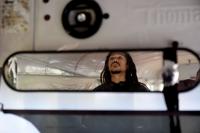Descendants of the Alabama steamship owner responsible for illegally bringing 110 African captives to America aboard the last U.S. slave ship have ended generations of public silence, calling his actions more than 160 years ago “evil and unforgivable.”
In a statement released to , members of Timothy Meaher's family — which is still prominent around Mobile, Alabama — said that what Meaher did on the eve of the Civil War “had consequences that have impacted generations of people.”
“Our family has been silent for too long on this matter. However, we are hopeful that we — the current generation of the Meaher family — can start a new chapter,” said the statement. Two members of the Meaher family didn't respond to messages seeking additional comment Friday.
The statement came amid the release of a new documentary about the people who were brought to the United States aboard the slave ship Clotilda and their families. The film was acquired by Netflix and Higher Ground, the production company of Barack and Michelle Obama.
The Meaher family has started meeting with leaders of the community in around around Africatown, the community begun by the Africans in north Mobile after they were released from slavery at the end of the Civil War in 1865, the statement said.
Darron Patterson, a descendant of Clotilda captive Pollee Allen, said he met twice last month with a Meaher family member who contacted him through an intermediary. The discussions were cordial but didn't delve deeply into details of their shared history, he said.
“Our conversations were just about who we are as people,” he said. “I think it’s important that we begin there.”
Patterson was president of the Clotilda Descendants Association at the time. The current president, Jeremy Ellis, said the organization had been in contact with the Meaher family by email since the NBC story aired on Sunday Today, and members hoped for face-to-face talks.
‘I am interested in learning and seeking answers from the Meaher family about historical documents, artifacts and oral histories that can bring clarity to descendants," Ellis said.
The Clotilda, a wooden schooner, was the last ship known to bring captives to the American South from Africa for enslavement. Decades after Congress outlawed the international slave trade, the Clotilda sailed from Mobile on a trip funded by Timothy Meaher, whose descendants still own millions of dollars worth of real estate around the city. A state park in Mobile Bay bears the family's name.
The Clotilda’s captain took his human cargo off the ship in Mobile and set fire to the vessel to hide evidence of the journey. The people, all from West Africa, were enslaved.
Remains of the ship were discovered mostly intact on the muddy river bottom about four years ago, and researchers are still trying to determine the best way to preserve what's left of the wreck, which many in Africatown hope will become part of a resurgence of their community.
The statement said Meaher family members “believe that the story of Africatown is an important part of history that needs to be told.”
“Our goal is to listen and learn, and our hope is that these conversations can help guide the actions our family takes as we work to be better partners in the community,” it said.
The statement “falls short” because it fails to mention two other Meaher brothers who conspired with Timothy Meaher and the family's decision to lease land to paper companies responsible for pollution around Africatown, Ellis said.
While some members of the Africatown community have advocated for for Clotilda descendants, the family's statement made no mention of that topic. The fact that the family has started a conversation with slave descendants could be a lesson to other families whose ancestors were involved in the slave trade, Patterson said.
“I hope that what the Meaher family is showing here rubs off on the families of other enslavers,” he said.
___
Reeves is a member of AP's Race and Ethnicity team.








































